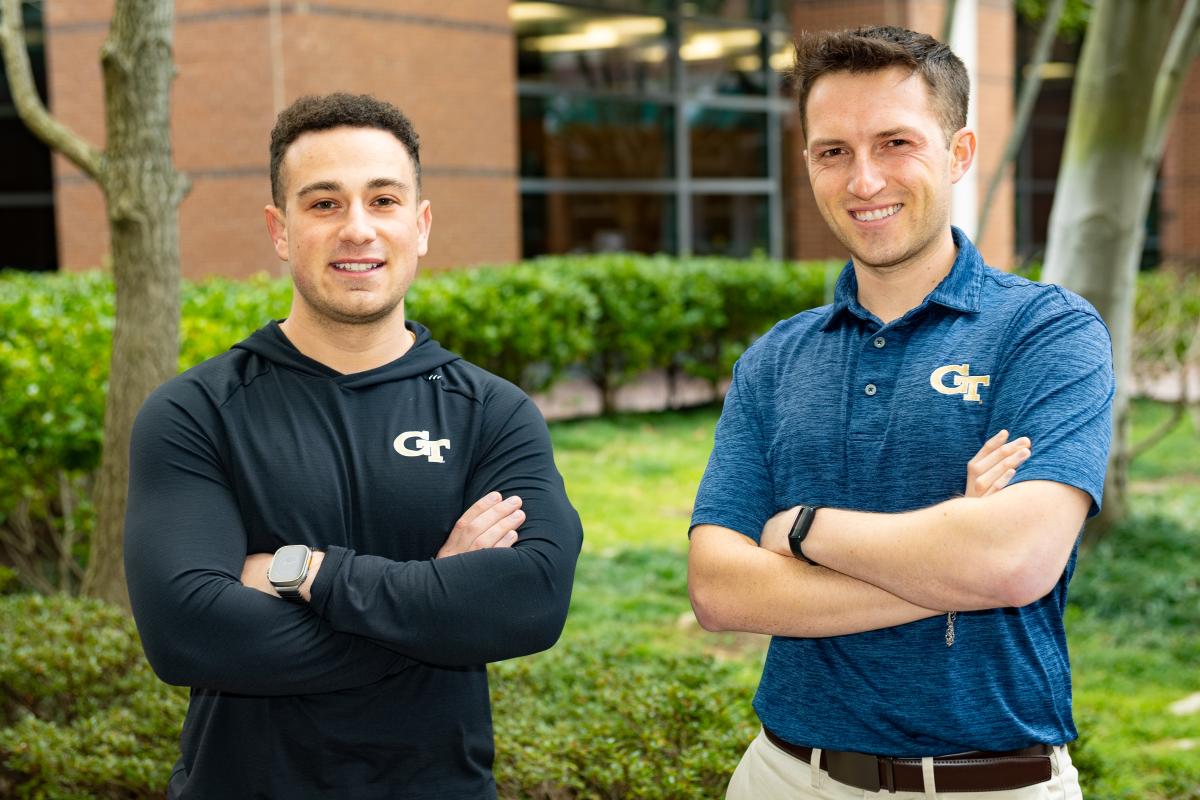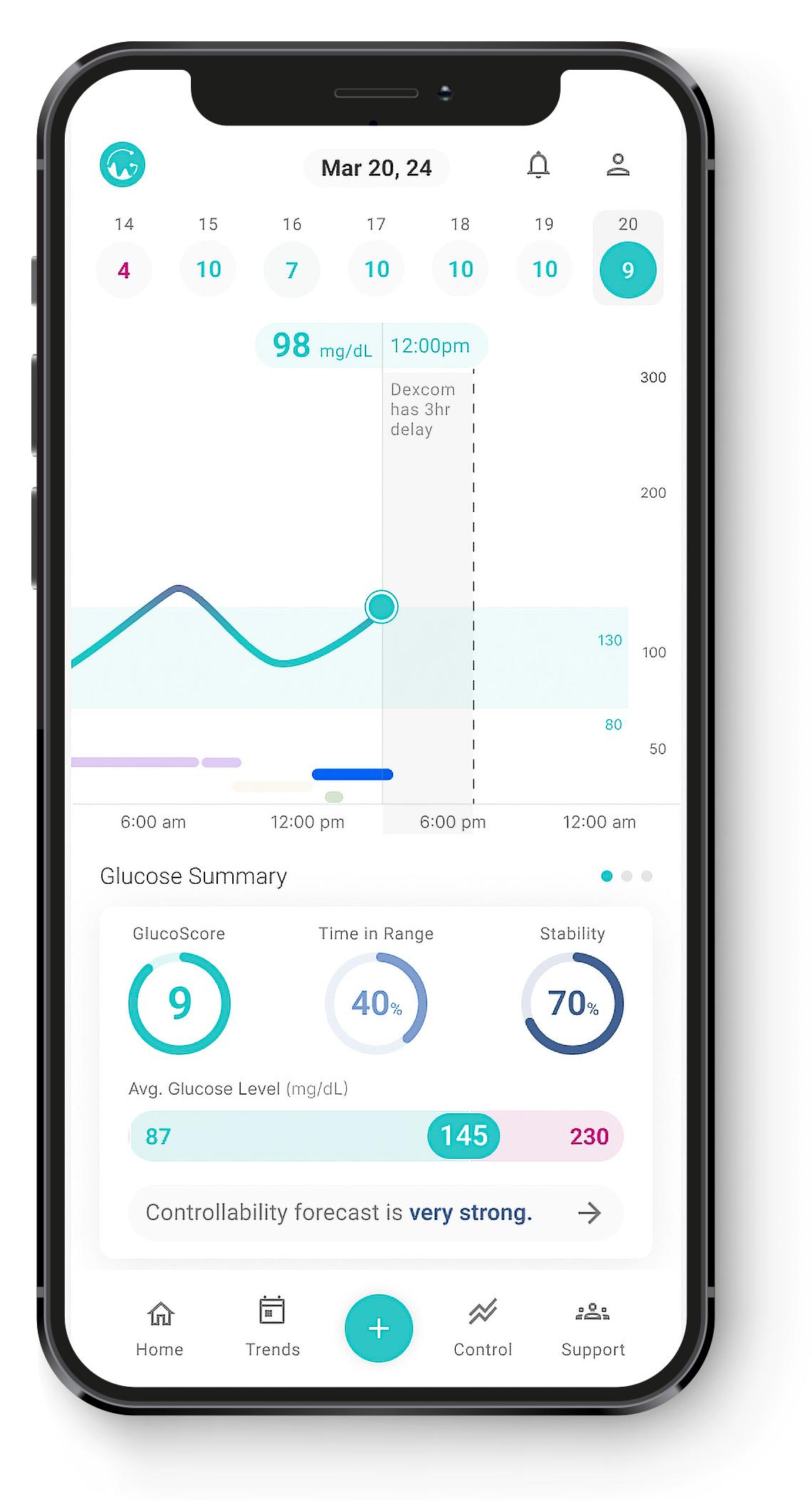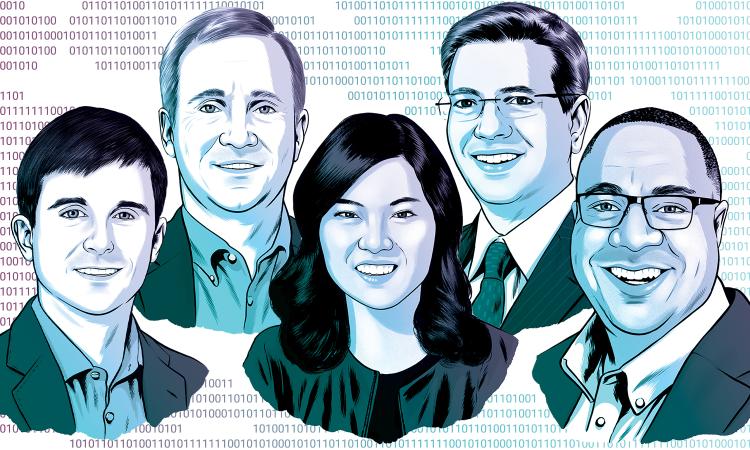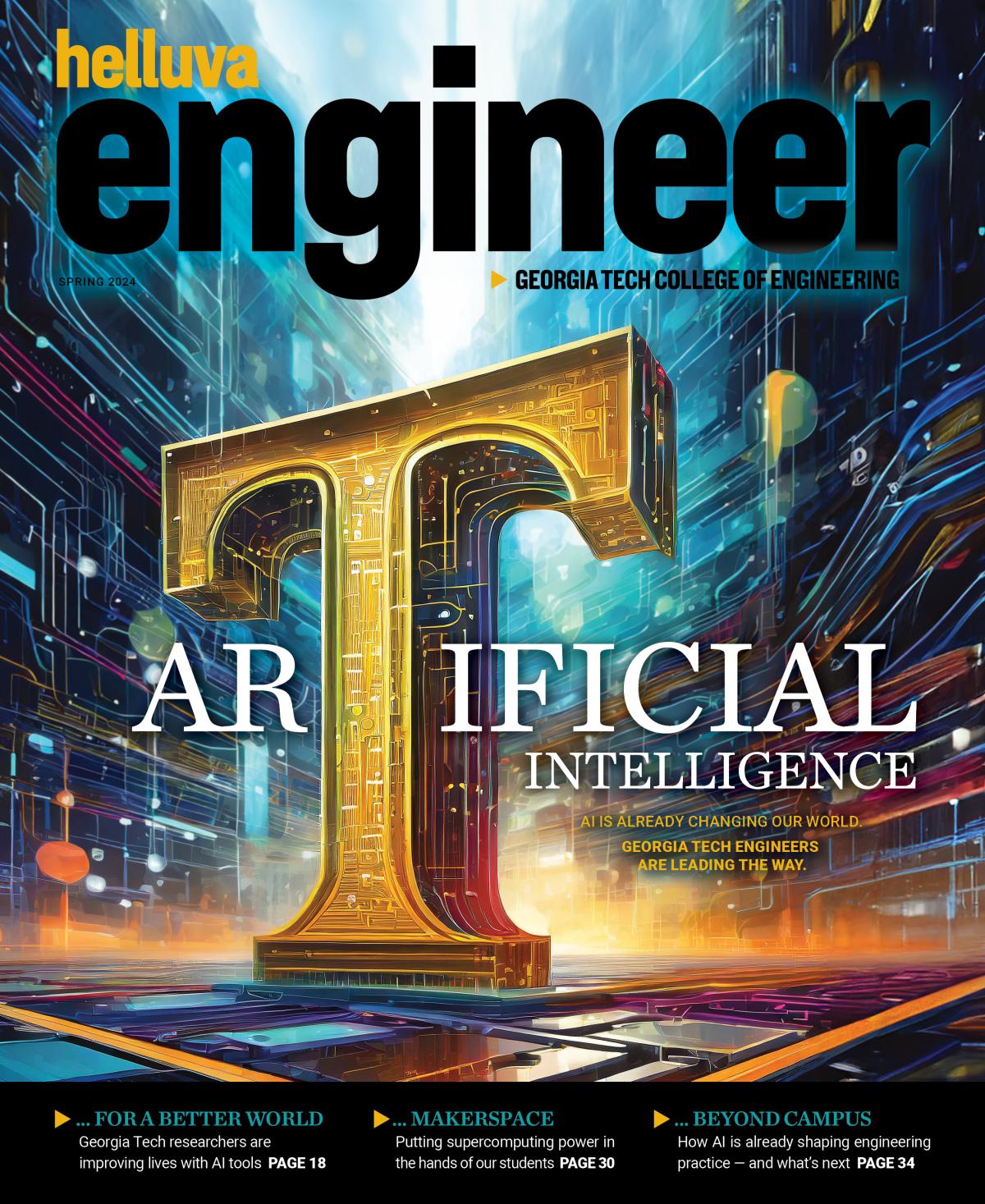With GlucoSense, alumni are creating a single tool to help diabetes patients wrangle data to better manage their health.
(text and background only visible when logged in)

Jonathan Fitch and Cole Chalhub, CEO and COO of AI startup GlucoSense. (Photo: Candler Hobbs)
(text and background only visible when logged in)
It was a scenario that plays out a hundred times at the end of every semester at Georgia Tech: Jonathan Fitch had pulled an all-nighter, using every possible moment to study for that day’s final exam.
After putting the stress of the test behind him, Fitch returned to his fraternity house for a much-needed nap.
The difference for Fitch was that instead of waking up refreshed, he woke up in the hospital.
Fitch has Type 1 diabetes, and he’d had a seizure because his blood sugar dropped without warning.
Fitch’s diabetes is considered well-controlled. Yet a combination of factors conspired against him that day: not enough rest and recovery, high stress levels that made the insulin in his system less effective, and then that nap. While Fitch rested, all the insulin that had been delivered by his insulin pump finally started to kick in. He got an alert that he was in trouble, but it was less than a minute before the seizure. It was simply too late.
In typical Georgia Tech engineer fashion, Fitch decided he could do something to prevent similar situations — for himself and millions of people with diabetes.
“We have all this data from an Apple Watch, Whoop, and other wearables. Type 1 diabetics also have an insulin pump and continuous glucose monitor or blood sugar sensor. But this data doesn’t really come together and do something for the user. We have to look at it in isolation,” said Fitch, who finished his industrial engineering bachelor’s in 2023. “What we’ve built is a place for all this data to come together to help predict the unpredictable — that seizure being a perfect example.”
That place is GlucoSense, which Fitch is building along with fellow Georgia Tech grads Cole Chalhub and Gabriel Gusmão. The platform pulls the information he described into a simple interface anyone can use to understand and act on it. Healthcare providers would have access, too, so they can work with patients to use insights from the data to better manage their disease.
Using custom-built artificial intelligence models, GlucoSense will predict how users’ bodies will react after a workout, for example, or what kind of day they’ll have to manage.
Using custom-built artificial intelligence models, GlucoSense will predict how users’ bodies will react after a workout, for example, or what kind of day they’ll have to manage.
“When you wake up in the morning, the app offers a benchmark about how difficult it will be to control your diabetes today,” said Fitch, the company’s CEO. “Is it going to be a normal day? Or is it going to be more challenging? If it’s more difficult, back off the excess carbs or really intense exercise, and especially back off the drinking, because your body is not recovered.”
He said the mental load for people with diabetes can be significant, pointing to estimates that the average Type 1 diabetic makes many more health-related decisions every day than someone who doesn’t have diabetes. When they eat, before they do anything, when they feel stressed, “you’re thinking about how that’s going to impact you and you have to dose your insulin accordingly,” he said.

The GlucoSense app compiles data from wearables, glucose monitors, and more to give patients insights they can use to manage their diabetes. (Courtesy: GlucoSense)
“Right now, you’re left to make these assumptions and think of all this data yourself. We’re bringing it into a single scale that you can look at and say, ‘OK, I’m ready for this activity or not.’ Or, ‘After this activity, it’s going to be difficult or easy to recover.’”
GlucoSense has been enrolling patients in its beta test this winter and spring, and the team is aiming for a full launch in the summer. They have enough initial capital from angel investors to give them runway to get their tool off the ground.
“We’re really refining and testing the product — getting those initial users on it, watching them use it, figuring out what’s confusing, and then refining it,” said Chalhub, GlucoSense chief operating officer and a 2022 industrial design graduate. “We’re also researching what other technologies we can integrate as we build out our interactive platform for patients and health providers.”
Both Chalhub and Fitch have dabbled in entrepreneurship over the years.
Chalhub spent some time thinking about how to create digital menus for restaurants before the pandemic made QR-code menus a common experience. Fitch started — and recently sold — a company that built custom solutions for people to control devices in their homes.
When Fitch decided to make a run at developing the seed of the idea he had for a diabetes management platform, he signed up for the CREATE-X program and got to work. Last summer, GlucoSense completed CREATE-X Startup Launch.
“Through every challenge, Georgia Tech has been there to support us,” Chalhub said. “We’ve had professors reviewing our algorithms. We’ve had introductions to the head of the design master’s program. We’ve scheduled calls with CREATE-X leaders on short notice because we were having to make decisions quickly. There has been someone there at every turn.”
Fitch said the resources at Tech have been essential from the very beginning when what is now GlucoSense was just an idea: “They’re there to make sure that we don’t fail and make sure we always have access to the right people.”
Fitch grew up in Atlanta, and he’s often thought about going somewhere new. But his ties to the talent and resources along North Avenue are keeping him happily tethered to Midtown.
“Tech is a place I want to hire from and grow the company around,” he said.
Hurdles remain as GlucoSense grows and the team readies for commercial release. They still need real-time access to data from continuous glucose monitoring (CGM) systems. Initially, that data will be delayed by three hours. Still, at launch, the platform will be able to use activity and workout information along with historical data to forecast what will happen after specific activities or how difficult it will be for users to manage their diabetes each day.
Back when Fitch experienced that seizure after his final exam, his CGM alerted him about 60 seconds ahead of time — not soon enough to avoid it. But with GlucoSense? Things might’ve been different.
“With GlucoSense, that seizure could have been predictable significantly earlier — like 30 minutes prior,” Fitch said. “So, in a perfect world, it could have been avoided.”
(text and background only visible when logged in)
(text and background only visible when logged in)
Related Stories

What IS Artificial Intelligence?
Engineers working in machine learning and AI offer a crash course in the basic concepts and buzzwords that have moved from the lab to everyday life.

AI Beyond Campus
Corporate leaders with ties to the College describe AI in their current roles, what will happen in the next five years, and how students and professionals will need to adapt.

A Magician for Furniture
Jane Ivanova came to Tech to build her technical skills. She left with the entrepreneurial tools to build a startup she hopes will simplify interior design.
(text and background only visible when logged in)

Helluva Engineer
This story originally appeared in the Spring 2024 issue of Helluva Engineer magazine.
Georgia Tech engineers are using artificial intelligence to make roads and rivers safer, restore or boost human function, and enhance the practice of engineering. We’re building the technology and infrastructure to power tomorrow’s AI tools. And we’re giving our students the AI courses and supercomputing power they need to be ready. AI is changing our world, and Georgia Tech engineers are leading the way.